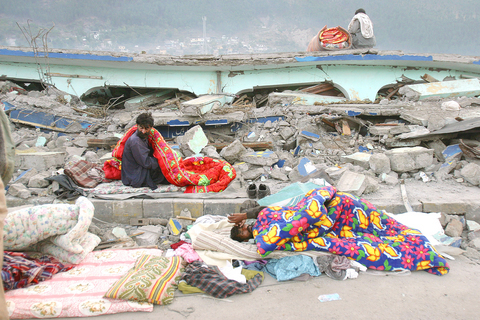Pakistan yesterday raised the official death toll from last week's massive earthquake to more than 25,000, with some 63,000 injured.
"The official death toll is 25,000 plus and the number of injured is more than 63,000," chief military spokesman Major General Shaukat Sultan said.
The 7.6-magnitude quake devastated large swathes in the country's north and Pakistani-controlled Kashmir when it struck on Saturday morning.

PHOTO: AP
Sultan said Muzaffarabad, the capital of Pakistani Kashmir, was the worst-hit area where the "maximum number of casualties have been reported." More than 11,000 people perished there, officials have said.
Thousands more died in Bagh and Rawalakot, also near the epicenter in Kashmir, and at least four big towns in North West Frontier Province.
The spokesman said the number of army casualties was 452 dead and some 730 injured. Troops blasted open a key footpath to isolated mountain villages in Pakistan Thursday, while locals used rafts to bring the first aid to areas cut off when a bridge was downed by a huge quake.
Hundreds of people who were desperate to discover the fate of their families surged through after army engineers dynamited and bulldozered a landslide blocking the route out of Muzaffarabad. With brightly colored sheets full of food and bottled water over their shoulders, they moved on up the treacherous path towards the Neelum Valley, where even the helicopters have not been able to land since Saturday's disaster.
Shabbir Shah Gilani, 38, a businessman living in the southern city of Karachi, arrived in Muzaffarabad yesterday morning after hearing no news for six days about the village where he was born.
"Fourteen members of my family still live there and I have to find out about them. I heard from people who have been able to get out that all the villages have been crushed by the earthquake," he said.
Around Muzaffarabad whole mountainsides sloughed off during the quake, crushing villages and wrecking the only bridge to valleys in the immediate north.
UN Emergency Relief Coordinator Jan Egeland arrived in Pakistan yesterday to work on relief efforts.

Auschwitz survivor Eva Schloss, the stepsister of teenage diarist Anne Frank and a tireless educator about the horrors of the Holocaust, has died. She was 96. The Anne Frank Trust UK, of which Schloss was honorary president, said she died on Saturday in London, where she lived. Britain’s King Charles III said he was “privileged and proud” to have known Schloss, who cofounded the charitable trust to help young people challenge prejudice. “The horrors that she endured as a young woman are impossible to comprehend and yet she devoted the rest of her life to overcoming hatred and prejudice, promoting kindness, courage, understanding

US President Donald Trump on Friday said Washington was “locked and loaded” to respond if Iran killed protesters, prompting Tehran to warn that intervention would destabilize the region. Protesters and security forces on Thursday clashed in several Iranian cities, with six people reported killed, the first deaths since the unrest escalated. Shopkeepers in Tehran on Sunday last week went on strike over high prices and economic stagnation, actions that have since spread into a protest movement that has swept into other parts of the country. If Iran “violently kills peaceful protesters, which is their custom, the United States of America will come to

‘DISRESPECTFUL’: Katie Miller, the wife of Trump’s most influential adviser, drew ire by posting an image of Greenland in the colors of the US flag, captioning it ‘SOON’ US President Donald Trump on Sunday doubled down on his claim that Greenland should become part of the US, despite calls by the Danish prime minister to stop “threatening” the territory. Washington’s military intervention in Venezuela has reignited fears for Greenland, which Trump has repeatedly said he wants to annex, given its strategic location in the arctic. While aboard Air Force One en route to Washington, Trump reiterated the goal. “We need Greenland from the standpoint of national security, and Denmark is not going to be able to do it,” he said in response to a reporter’s question. “We’ll worry about Greenland in

PERILOUS JOURNEY: Over just a matter of days last month, about 1,600 Afghans who were at risk of perishing due to the cold weather were rescued in the mountains Habibullah set off from his home in western Afghanistan determined to find work in Iran, only for the 15-year-old to freeze to death while walking across the mountainous frontier. “He was forced to go, to bring food for the family,” his mother, Mah Jan, said at her mud home in Ghunjan village. “We have no food to eat, we have no clothes to wear. The house in which I live has no electricity, no water. I have no proper window, nothing to burn for heating,” she added, clutching a photograph of her son. Habibullah was one of at least 18 migrants who died